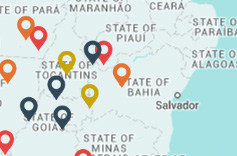Bamidelê – Organization of Black Women (Paraíba)
Wa Bájà: quilombo women fighting for racial and gender equality as a human right, toward a black-quilombo identity
Paraíba
Objectives and target population:
The project’s objective is to put together the Ciranda, a cultural manifestation aimed at schools and community organizations, in order to combat environmental racism and strengthen black-quilombo identity among the remaining quilombo descendants in the community known as Caiana dos Crioulos in Alagoa Grande, Paraíba.
Main activities:
– Workshops to debate environmental racism—a manifestation of institutional violence that inflicts the quilombo community with a discriminatory context marked by the absence of effective public policies;
– Workshops on the Ciranda and Ciranda circles (regional song and dance) to be held in the community at significant times;
– Several debates will also be held to construct strategies for political action;
– A seminar on the role of quilombo women in confronting discrimination;
– An encounter of Ciranda performers from Alagoa Grande, in celebration of Black Consciousness Day (November 20 in Brazil);
– Produce documents from the workshops and events that will be circulated, presented and debated jointly with local and state public administrators, as well as local and regional legislators.
Previously supported project:
It is the third time Bamidelê receives support from the Fund. The other two projects were “Strengthening the anti-racist struggle in Paraíba,” in 2009; and “Affirmative action in public institutions of higher education – Defending racial quotas in the state of Paraíba”, in 2010.
Context:
Quilombo-descendant communities represent one of the black population’s expressions of resistance to slavery and racism. Caiana dos Crioulos is recognized as a quilombo by the Palmares Cultural foundation and the National Colonization and Agrarian Reform Institute (Incra in Portuguese). However, the community has little infrastructure, with inadequate social services and equipment, especially in the areas of health care and education; and with regard to state-provided water quality.
The precariousness of the situation betrays environmental racism: “We label ‘environmental racism’ these social and environmental injustices that relentlessly inflict the most vulnerable ethnicities and populations. Environmental racism isn’t just actions with racist intent, but, equally, those with a ‘racial’ impact, regardless of the intention with which they originate.” (Pacheco: 2007).
About the organization:
Bamidelê – Organization of Black Women – was created in order to connect the anti-racist struggle with black feminism, as a crucial element for the construction of racial equality and elimination of oppression experienced by black women in Brazil. The group is active in Paraíba, a state marked by a profoundly racist, patriarchal and oligarchical culture.
The group undertakes actions promoting social control of public policies; activities in the area of health care of black populations, including sexual and reproductive health and rights; courses, lectures, workshops, training sessions, seminars, media and advocacy campaigns.
Partnerships:
What differentiates the group’s activities is the inter-institutional cooperation with other feminist organizations, such as the Network of Women in Cooperation in Paraíba, the Organized Black Movement in Paraíba and with quilombo-descended communities.
The group also includes the National Network of Black Women’s Organizations; the Brazilian Women’s Network; and the National Feminist Health, Sexual Rights and Reproductive Rights Network. Currently the organization has a seat on the Municipal Council of Women’s Rights of João Pessoa and on the Paraíba State Board of Education and Ethnic-racial Diversity.
Funding Line
Annual Call for Proposals
Year
-
Total Granted
-
Duration
-
Main Themes
Confronting racism






